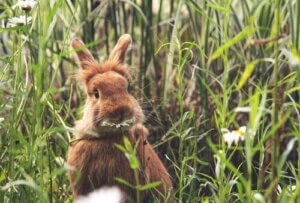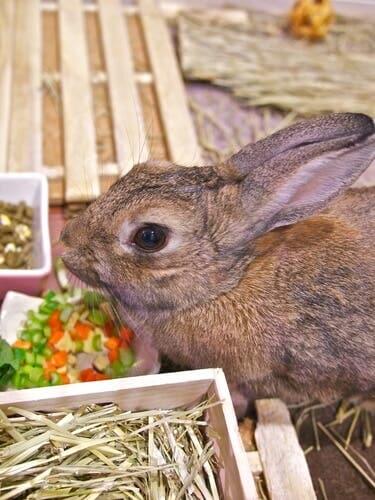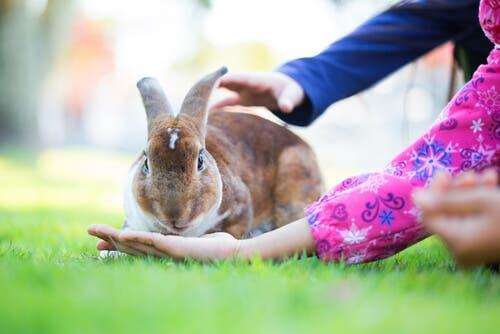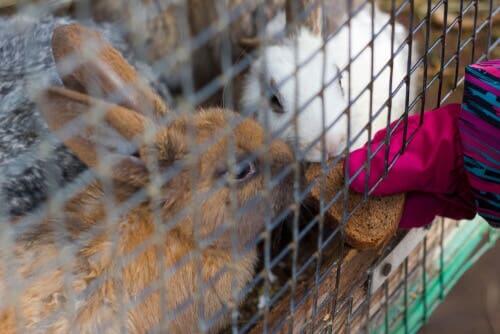Important Feeding Guidelines for Rabbits

Rabbits are herbivorous animals, so feeding them is simple. For one, there’s a wide range of food created just for them on the market. You might have doubts in regard to the proper feeding guidelines for rabbits, so continue reading to find out more about how to add variety to your pet’s diet.
Feeding guidelines for rabbits
In spite of their similarities, rabbits aren’t rodents. They’re herbivores and their teeth never stop growing. This is why they have to wear them down every day.
A healthy diet in a rabbit must be balanced and help them meet the need to wear down their teeth. A diet that doesn’t allow the rabbit to chew will always end up leading to serious dental health problems.
To balance a diet, we can take into account these percentages: 70% of the daily diet for rabbits must be composed of hay, 20-25% of vegetables and the remaining percentage must be divided between feed, fruit, and treats.

In addition to all the foods listed below, the rabbit should always have an unlimited supply of fresh drinking water available. The vegetables you provide should always be fresh, raw, washed, and at room temperature. You must clean their cage daily to clear out any food debris in order to prevent bacteria and foul smells.
Feeding rabbits – hay
Hay is the most important food for your rabbit. There should always be plenty of clean hay in their cage, as much as they wish to eat.
It’s a must for rabbits, as well as guinea pigs. This is because chewing it helps them wear down their teeth at a proper rhythm. In addition, it provides fiber for the proper functioning of their digestive system. It also provides the necessary nutrients they need from their diet.
You’ll find different types of plant matter at the pet store. Grasses (such as oats) may be best suited, but weeds (such as alfalfa) are also beneficial. To choose the best one for your rabbit, try several different ones, and find out which one they like best.
Fresh vegetables
Only 20% of the rabbit feed should consist of fresh vegetables. These products are high in nutrients, but they don’t wear down teeth as effectively as the grasses and weeds mentioned above. However, you can add variety to their diet with vegetables. There are many available to choose from on the market.

Give them green leafy vegetables, the darker the better because they have the largest concentration of nutrients. For instance, spinach and Swiss chard are both a great option, while lettuces are less nutritious. Definitely discard iceberg lettuce from their diet.
Other examples of green leafy vegetables you can add to your rabbit’s diet:
- Artichokes
- Brussels sprouts
- Corn salad (lamb’s lettuce)
- Garden cress
- Celery, cauliflower and cucumber leaves
In addition, there are other vegetables that rabbits can enjoy. Don’t feed them the same amount as green leafy vegetables, just add them to their diet. For example, anyone who knows rabbits knows they like carrots, red bell peppers, green bell peppers, and even zucchini.
Fruit and other types of food
There are other types of food that can be very interesting to a rabbit, although we should give them in moderation. Either because they can lead to indigestion in large quantities or because they contain too much sugar.
Fruit is a healthy option and experts recommend you give them up to one tablespoon of it per day. Try to buy seasonal fruit so you can vary the flavors and textures. Strawberries, peaches, apples, and pears are quite easy to find.
There are many animal food products on the market, so if this is all you feed them you must keep in mind it’s never a substitute for hay. As we said above, it doesn’t meet their gnawing need. Similarly, opt for a high-end rabbit-specific feed and give them about a tablespoon every day.

There are commercial treats you can give your rabbit, but use them in moderation. If you want to give them treats then opt for homemade, fresh food. Most commercial processed food isn’t healthy. You could, for example, give them oven-dried apple slices or dried fruit.
Types of food that could be toxic to a rabbit
Keep in mind that not all vegetables are good for your rabbit and some can be toxic. Avoid feeding your rabbit with any of these types of food:
- Sugar, salt, oil
- Avocado
- Garlic
- Potatoes
- Onions, scallions and anything from this species
- Beets
- Citruses like orange, grapefruit, and lemons, among others
Hay should be the basis of a rabbit diet, but there are many options to complement it. Take advantage of seasonal vegetables, fruits, and vegetables in order to add variety to the animal’s plate and make the act of feeding your rabbits as fun as it is nutritious.
We hope these feeding guidelines for rabbits have been useful!
Rabbits are herbivorous animals, so feeding them is simple. For one, there’s a wide range of food created just for them on the market. You might have doubts in regard to the proper feeding guidelines for rabbits, so continue reading to find out more about how to add variety to your pet’s diet.
Feeding guidelines for rabbits
In spite of their similarities, rabbits aren’t rodents. They’re herbivores and their teeth never stop growing. This is why they have to wear them down every day.
A healthy diet in a rabbit must be balanced and help them meet the need to wear down their teeth. A diet that doesn’t allow the rabbit to chew will always end up leading to serious dental health problems.
To balance a diet, we can take into account these percentages: 70% of the daily diet for rabbits must be composed of hay, 20-25% of vegetables and the remaining percentage must be divided between feed, fruit, and treats.

In addition to all the foods listed below, the rabbit should always have an unlimited supply of fresh drinking water available. The vegetables you provide should always be fresh, raw, washed, and at room temperature. You must clean their cage daily to clear out any food debris in order to prevent bacteria and foul smells.
Feeding rabbits – hay
Hay is the most important food for your rabbit. There should always be plenty of clean hay in their cage, as much as they wish to eat.
It’s a must for rabbits, as well as guinea pigs. This is because chewing it helps them wear down their teeth at a proper rhythm. In addition, it provides fiber for the proper functioning of their digestive system. It also provides the necessary nutrients they need from their diet.
You’ll find different types of plant matter at the pet store. Grasses (such as oats) may be best suited, but weeds (such as alfalfa) are also beneficial. To choose the best one for your rabbit, try several different ones, and find out which one they like best.
Fresh vegetables
Only 20% of the rabbit feed should consist of fresh vegetables. These products are high in nutrients, but they don’t wear down teeth as effectively as the grasses and weeds mentioned above. However, you can add variety to their diet with vegetables. There are many available to choose from on the market.

Give them green leafy vegetables, the darker the better because they have the largest concentration of nutrients. For instance, spinach and Swiss chard are both a great option, while lettuces are less nutritious. Definitely discard iceberg lettuce from their diet.
Other examples of green leafy vegetables you can add to your rabbit’s diet:
- Artichokes
- Brussels sprouts
- Corn salad (lamb’s lettuce)
- Garden cress
- Celery, cauliflower and cucumber leaves
In addition, there are other vegetables that rabbits can enjoy. Don’t feed them the same amount as green leafy vegetables, just add them to their diet. For example, anyone who knows rabbits knows they like carrots, red bell peppers, green bell peppers, and even zucchini.
Fruit and other types of food
There are other types of food that can be very interesting to a rabbit, although we should give them in moderation. Either because they can lead to indigestion in large quantities or because they contain too much sugar.
Fruit is a healthy option and experts recommend you give them up to one tablespoon of it per day. Try to buy seasonal fruit so you can vary the flavors and textures. Strawberries, peaches, apples, and pears are quite easy to find.
There are many animal food products on the market, so if this is all you feed them you must keep in mind it’s never a substitute for hay. As we said above, it doesn’t meet their gnawing need. Similarly, opt for a high-end rabbit-specific feed and give them about a tablespoon every day.

There are commercial treats you can give your rabbit, but use them in moderation. If you want to give them treats then opt for homemade, fresh food. Most commercial processed food isn’t healthy. You could, for example, give them oven-dried apple slices or dried fruit.
Types of food that could be toxic to a rabbit
Keep in mind that not all vegetables are good for your rabbit and some can be toxic. Avoid feeding your rabbit with any of these types of food:
- Sugar, salt, oil
- Avocado
- Garlic
- Potatoes
- Onions, scallions and anything from this species
- Beets
- Citruses like orange, grapefruit, and lemons, among others
Hay should be the basis of a rabbit diet, but there are many options to complement it. Take advantage of seasonal vegetables, fruits, and vegetables in order to add variety to the animal’s plate and make the act of feeding your rabbits as fun as it is nutritious.
We hope these feeding guidelines for rabbits have been useful!
This text is provided for informational purposes only and does not replace consultation with a professional. If in doubt, consult your specialist.








